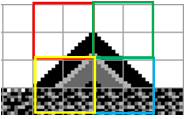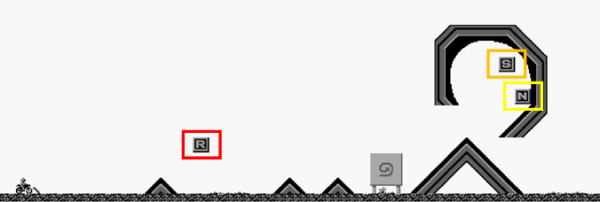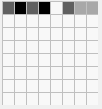If you are still using the old URL (datacrystal.romhacking.net), please update your bookmarks! The old URL may stop working soon.
The current URL is datacrystal.tcrf.net.
The current URL is datacrystal.tcrf.net.
Motocross Maniacs/Notes
Jump to navigation
Jump to search
| Motocross Maniacs | |
| Internal Name | "MOTOCROSSMANIAC" |
| Region Code | x01 (non-Japanese) |
| Type | Grayscale Game |
| SGB Support | x00 (not SGB) |
| Cartridge Type | ROM |
| License Code | x0000 (new license) |
| ROM Size | x00 (32 KiB) |
| ROM Checksum | x4EEF |
| SRAM Size | xxx |
| Header Checksum | x57 |
The goal of these notes is to provide enough elements for someone to hopefully write a basic level editor.
This Konami classic is a tiny ROM that only contains 2 banks. And no bank switching = less headaches for disassembly!
Course data
General idea
Courses 1 to 8 are simply sequences of course objects, such as ramps, bumps, etc. These course objects are placed one after the other, from left to right. Below is the beginning of course 1: floor, small triangular ramp, floor, etc.Each course has two laps, both identical, so only lap 1 requires definition.
A course object is an array of metatiles, where each metatile is 16x16px (each metatile is a 2x2 array of regular 8x8px tiles). Below is a small triangular ramp object: it's made of 4 metatiles (each in a different color), and each metatile is made of 4 tiles.
Course data
Course data structure
In the ROM data, a course is defined by a sequence of 3-byte words YY XX ZZ: * YY XX = coordinates (from top left) of the upper-lefthand corner of the object. Units are in metatiles (= 2 tiles). * ZZ = objectID Below is a sample of course 1, with 3-byte words highlighted.* First object = floor (ID=x00), located at (x0F,x00). * Second object = small triangular ramp (ID=x01), located at (x0E,x0A). The length of the lap of a course is bounded by xFF.
Course data location in ROM
* 0x4760-0x476F - table of 8 pointers to the 8 courses * 0x4770-0x4908 - course 1 data * 0x4909-0x4AE3 - course 2 data * 0x4AE4-0x4C8E - course 3 data * 0x4C8F-0x4E9C - course 4 data * 0x4E9D-0x5062 - course 5 data * 0x5063-0x52A0 - course 6 data * 0x52A1-0x54C0 - course 7 data * 0x54C1-0x56CB - course 8 data Note that each chunk of course data ends with xFF.
Course object data
Course object data structure
In the ROM data, a course object is defined by a sequence of bytes XX YY AA BB.... * XX YY define the metatile array's dimensions: XX rows and YY columns. * AA BB... are the metatileIDs that will fill the array, one line at a time.
Course 1 contains x87 (=103) course objects. Below are the first two: a floor object, followed by a small triangular ramp object.* The floor object is a row of x0A metatiles with ID x09. * The small triangular ramp object is a 2x2 array of metatiles x0A, x0B, xC and x0D.
Note that the sequence of course objects does not need to be ordered. The game constantly reads through the entire sequence to determine which objects to place next.
Course object data location in ROM
* x56CC-x5793 - table of pointers to course object definitions * x5794-x579F - object x00 (floor) * x57A0-x57A5 - object x01 (small triangular ramp) * ... * x5A19-x5A1E - object x63 (short circular ramp up)
Course objects
The table of pointers to course object definitions contains x63 pointers, but several objects have multiple IDs.
Certain course objects with different IDs appear very similar, but they are often translated by 1 tile, the reason being that these objects are positioned on a metatile grid, and can only be moved around in multiples of 2 tiles.
Metatile data
Metatile data structure
Metatiles are 16x16px, and are made of 2x2 arrays of 8x8px tiles. They are defined with 4 consecutive bytes, the first two are the top half of the array, the last two are the lower half.The top-left metatile (in red) is defined by x7F x7F x7F x1E, where x7F is blank and x1E is a chunk of ramp. The bottom-left metatile (in yellow) is defined by x1E x1A x8E x8E, where x1A is an inner chunk of ramp, and x8E is floor.
Metatile data location in ROM
* x5A1F-5C8E
Item data
Items are the various power-ups you can collect throughout a course: N for Nitrous boost, T for tires, S for speed, etc. These items are placed on the course just like the other course objects.
Item data structure
In the ROM data, items are defined by 3-byte words YY XX ZZ: * YY XX = coordinates from top left of the course * ZZ = itemID Possible IDs are: * x02 = S for speed * x03 = T for tire * x04 = N for nitro * x05 = R for traction * x06 = mini-bikers hitbox (invisible) * x07 = jet hitbox (invisible)
Item data location in ROM
Note that data for course 8 appears before data for course 7.
* 0x5EAB-0x5F0A - table of 8 pointers to item data for each of the 8 courses x5F0B x5F54 x5F91 x5FBF x5FF9 x603C x60AD x6079 * 0x5F0B-0x5F53 - course 1 item data * 0x5F54-0x5F90 - course 2 item data * 0x5F91-0x5FBE - course 3 item data * 0x5FBF-0x5FF8 - course 4 item data * 0x5FF9-0x603B - course 5 item data * 0x603C-0x6078 - course 6 item data * 0x6079-0x60AC - course 8 item data * 0x60AD-0x60E9 - course 7 item data Note that each chunk of item data ends with xFF.
Course music data
A table of 8 bytes at x677C specifies which background music to play for each of the 8 courses: x20 x1E x1F x1D x20 x1E x1F x1D The musicIDs are (note the IDs are not in course order): * x20 - course 1 music (same as course 5) * x1E - course 2 music (same as course 6) * x1F - course 3 music (same as course 7) * x1D - course 4 music (same as course 8) You can also use other (short) tunes from the game as well: * x19 - course select menu music * x1A - victory music, but no record * x1B - victory music, with a record * x1C - game over music
Computer opponent AI data
When the player passes the computer opponent and pushes it offscreen, the following data is accessed. The data is a sequence of checkpoints, which are tested against the player's current coordinates until the closest position is found. The computer's coordinates are then set to the new position.
Computer opponent AI structure
(todo) Data is organized in chunks of 5 bytes: * 2 bytes specify various checkpoints throughout the course * 3 bytes are used to set the computer's new position in the game
Computer opponent AI data location in ROM
* 0x60EA-0x60F9 - table of 8 pointers for offscreen computer opponent data for each of the 8 courses.
x60FA x61AE x6230 x62A8 x633E x63D4 x644C x64E2
* 0x60FA-0x61AD - course 1 data
* 0x61AE-0x622F - course 2 data
* 0x6230-0x62A7 - course 3 data
* 0x62A8-0x633D - course 4 data
* 0x633E-0x63D3 - course 5 data
* 0x63D4-0x644B - course 6 data
* 0x644C-0x64E1 - course 7 data
* 0x64E2-0x6xxx - course 8 data (todo)
Text data
Text data structure
Below are various text elements from the game, as well as their respective ROM locations. Text data is a sequence of words, each word structured as follows: * 2 bytes for the display address * a sequence of text tiles for the word * a terminal xFE when the word is finished * a terminal xFF when the text is finished
Text data location in ROM
Title screen
* 0x0EC1-0x0EC5 "TM" (from the Motocross Maniacs logo) at x990F * 0x0EC6-0x0EDC "TM AND © 1989 KONAMI" at x9940 * 0x0EDD-0x0EEF "INDUSTRY CO.,LTD." at x9960 * 0x0EDD-0x0EEF "INDUSTRY CO.,LTD." at x9960 * 0x0EF0-0x0F07 "LICENSED BY NINTENDO " (yes, an extra blank tile) at x9980 * 0x0F14-0x0F1A "SOLO" at x99E6 * 0x0F1B-0x0F28 "VS COMPUTER" at x99E6 * 0x0F29-0x0F36 "VS 2-PLAYER" at x9A06
Game over screen
Fun fact: the game over text data is nested in the title screen text data. * 0x0F08-0x0F13 "GAME OVER" at x98E6
Pre-race screen
* 0x0F37-0x0F48 "QUALIFYING TIME" at x99A3 * 0x0F49-0x0F4F ": :" at x99E8 * 0x0F50-0x0F5D row of 11 gray tiles at x9865 * 0x0F5E-0x0F6B " COURSE " at x9885 * 0x0F6C-0x0F79 row of 11 gray tiles at x98A5 * 0x0F7A-0x0F8A "COURSE RECORD" at x9924 * 0x0F8B-0x0F8F ": :" at x9968
Time up screen
This message doesn't contain a display address, only the text itself. * 0x2F66-0x2F6D "TIME UP" * 0x2F6E-0x2F75 (row of 9 gray tiles)
Gameplay data
Qualifying times data
Strange: they are lower than the course records. Qualifying times for each course require 3 bytes: XX YY ZZ, which represents a time of ZZ:YY.XX. For example, level 1A's time is 1:20.00 and is stored as 00 20 01. * 0x2DD1-0x2DE8 qualifying times for level A. * 0x2DEC-0x2E03 qualifying times for level B. * 0x2E04-0x2E1B qualifying times for level C.
Gravity data
* 0x2143-0x214A - a table of 8 bytes that is continuously read during the game, it specifies gravity pull. Changing all bytes to x38 creates a very slow descent for instance.
Going up ramps data
* 0x214B (todo)
Post-ramp boost behavior data
* 0x5CBF - in chunks of 4 bytes (todo)
Bike mid-air behavior data
* 0x5D8F - in chunks of 4 bytes (todo)
Nitro boost data
* 0x5E37 (todo)
Tileset data
Tile graphics data
Each of the 8 courses in the game uses the same tileset.
Tile data structure
Each 8x8px tile is defined by x0F (sixteen) consecutive bytes, so each row of a tile requires 2 bytes. If XX YY are two such bytes, the colors of the pixels of that given line are XX + 2*YY, where white = x00 / light gray = x01 / dark gray = x02 / black = x03.
For example, if the bytes of a given tile are x53 xF4 (and the rest are x00), written bitwise that's 01010011 11110100. And with the XX + 2*YY operation we get: 23230211, which gives us the following tile:
Tile graphics data location in ROM (todo)
It is located just before the course data. It ends at x475F.
Tile collision data (todo)
* Explore at x5C8F
Sprite data
* 0x3481-0x34F1 - a table of pointers for player sprite building (todo?)
Music and sound FX data
This section is work in progress, still very incomplete.
* 0x6F1F-0x6F5F - a table of pointers to music and sound FX data (todo)
The data itself seems to be in chunks of 4 bytes.
Pointer offsets (to be doubled) from the above pointer table lead to the following sound FX data:
* x00 to x06 - no nitros left (various sounds)
* x07 - pause jingle
* x08 - motor running
* x09 - crossing the finish line (?)
* x0A - nitro fired
* x0B - no nitros left click
* x0C - N or R item pick-up
* x0D - T item pick-up (high pitched than the previous one)
* x0E - when a backflip adds a small biker
* x0F - "3,2,1" countdown at the beginning of a course
* x10 - "Go!"
* x11 - strange ambulance siren sound (?)
* x12 - rolling is sand
* x13 - short selection beep (?)
* x14 - selection beep (?)
* x15 - motorbike falls and rolls over
* x16 - course selected sound ("nksh!")
* x17 - crowd roars when you win
* 0x7050-0x706D - a table of pointers to music data for the course 1/5 song














































